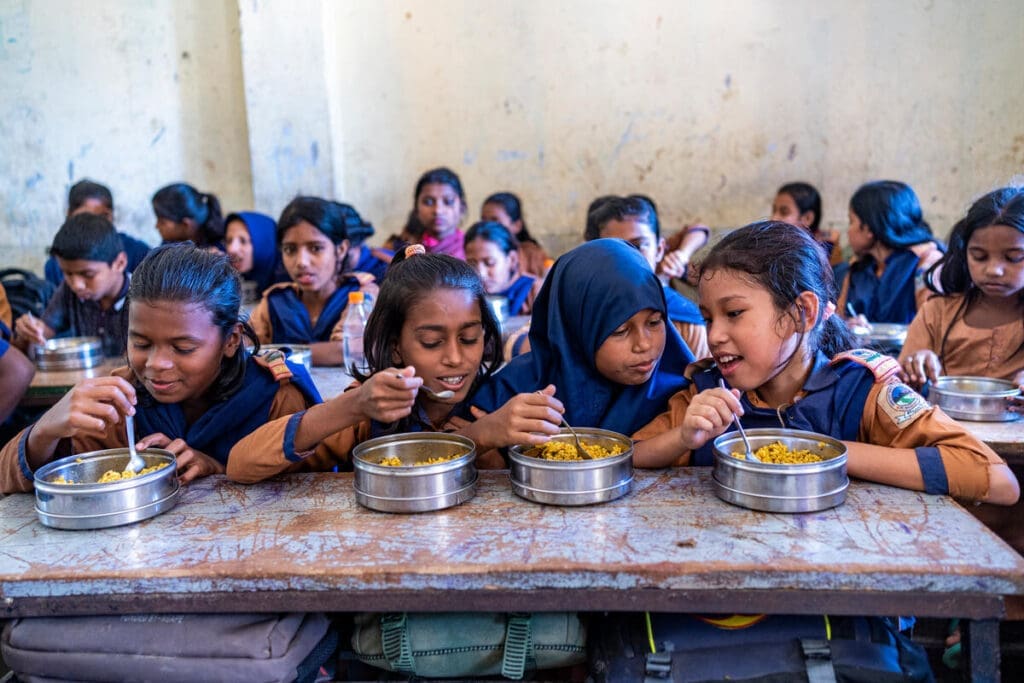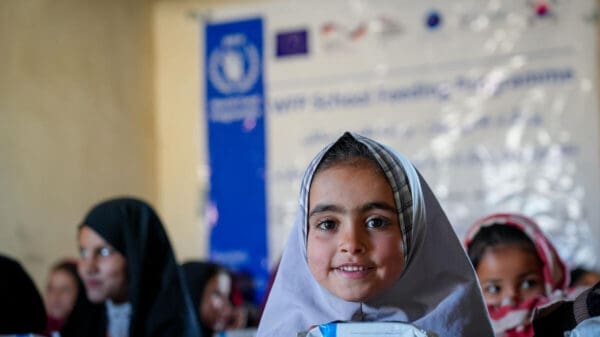The Effects of Child Nutrition on Academic Performance: How School Meals Can Break the Cycle of Poverty

Growling stomachs, fatigue and brain fog: Every day, millions of kids around the world go to school on empty stomachs. For many, a school meal is the only food they have each day.
“We know that a hungry child cannot learn, a hungry child cannot grow and a hungry child cannot reach their full potential,” says World Food Program USA CEO Baron Segar. “It’s our responsibility to make sure that over 15 million schoolchildren, every single year, have a daily meal so that they can stay in school.”
Nutritious food is essential not only for a child’s healthy growth, but for their academic performance as well. For impoverished families around the world, school meals help keep children in the classroom rather than working at home or entering early marriages. Children can then continue their education and secure a future for themselves, their families and communities.
Let’s explore how school meals and the work of United Nations World Food Programme (WFP) help break the cycle of poverty.
Related Articles
- 10 Facts About Child Hunger in the World
- Most Vulnerable Children Miss out on School Meals Amidst Global Food Crisis
- School Meals is Funding an Invaluable Investment in Humanity
Good Nutrition Improves Child Development and Academic Performance
It takes a lot of energy to think. In fact, around 20% of our daily calories are used as fuel for our brains. Some studies tell us that more challenging cognitive work burns more calories.
For a child’s brain to develop, they need a host of essential nutrients, from the right balance of protein, fats and carbohydrates to vitamins, minerals and water. Micronutrients like iron, zinc, choline, iodine, folate, B12, and healthy fats are also vital to cognitive development and learning.
Without the right nutrition, children’s healthy development is put at risk. Nutrient shortages can reduce brain cell production, impact cell size and complexity and even lead to less efficient communication between brain cells. This could result in slower language development, impaired fined motor skills and lower IQ, all of which causes negative impacts on a child’s life in and out of the classroom
The right balance of nutrients during the early stages of life is critical for brain development, promoting cognitive development long into adult years.

Children at Morakhola Government Primary School in Bangladesh WFP school meals.
Child Malnutrition Is Harmful to Health, Academics and Well-Being
Today, 45 million kids are suffering from severe malnutrition. Without treatment, they could experience delayed cognitive development, which can hurt their academic performance in the years to come.
School meals are a vital intervention for children’s healthy development. Yet, 73 million children in primary school living in extreme poverty don’t have access to school meals.
When kids don’t have access to food at school, it leads to a vicious cycle of hunger, school absences and poverty. There are millions of children – particularly girls – who don’t go to school because their families need them to help in the fields, take care of siblings or perform domestic duties. In war-torn countries, kids are twice as likely to be out of school than their peers in stable countries. This rises to 2.5 times more likely for girls. When kids miss school, they miss out on important developmental milestones such as understanding basic math concepts or reading and writing skills
“A daily meal serves as a very, very strong incentive for families to keep sending their children to school,” Segar said. “But by providing those meals for kids, we see around a 9% increase in enrollment (12% for girls).”
WFP School Meals Save Lives and Improve Futures
Nutritious school meals can transform a child’s life. These meals help to combat hunger, malnutrition and poverty by providing vital nutrition, promoting school attendance and ongoing learning, and supporting long-term health and well-being. School meals also boost attendance and graduation rates by giving students the nutrition they need to stay healthy, strong and focused on their studies.
The U.N. World Food Programme helps keep millions of kids in the classroom and focused on their lessons by providing nutritious school meals, snacks and take-home ingredients. We’re the world’s largest provider of school meals, reaching more than 20 million children in 59 countries around the world.
School meals: Increase school enrollment and attendance: In Bangladesh, nutrient fortified biscuits have improved school enrollment by 14.2% and reduced the probability of drop-outs by 7.5%. In Madagascar, attendance rates increased from 88% to 98% over two years after the introduction of take-home rations.
Improve children’s focus: In South Sudan, 13-year-old Joyce wants to be a pilot when she grows up. “I like going to school because I like to learn and be with my friends,” she says. “I like the food here because it helps me learn better.”

Joyce Sawa studies at Torit Model Primary School in South Sudan where WFP provides school meals.
Reduce financial burdens: James is another student at Joyce’s school. He hopes to become a doctor one day. “I lost my father, and my family doesn’t have a lot of money,” he says. “So, I work as a boda boda (motorcycle) driver to pay for my education and support my family.” A daily school lunch for James and his siblings means one less meal for him to worry about paying for every day.

James Oturi is studying Primary 8 at Grace Community school in South Sudan, where WFP is providing school meals.
The Impact of School Meals on Poverty and Social Change
School meals help to alleviate poverty and offset social norms that keep young girls out of the classroom. The value of a school meal is equivalent to about 10% of a household’s income. That means parents can save their money for other pressing needs. These savings also motivate parents to send their children, including girls, to school each day.
In Cambodia, with clouds of red dust in their wake, 14-year-old Heng Ouy and her 12-year-old sister Sheya ride their second-hand bicycles to school every morning. Their parents had to put five months of savings towards buying each bike. Money is tight at home, so a school-provided breakfast Hengy Ouy and Shreya receive every day is of enormous help to their family. “I want to be a teacher when I grow up,” says Heng Ouy. “I want to help my parents, so they no longer have to struggle.”

Ouy Heng and her sister are both recipients of a WFP funded school meals program at the Bos Thom school in Cambodia.
“Everywhere we implement school feeding, we see that disproportionately girls stay in school for longer,” says Carmen Burbano de Lara, director of the school feeding division at the U.N. World Food Programme’s headquarters in Rome. “The longer a girl stays in school, the less likely she is to marry or have children very early in life, which gives her a better start.”
School meals programs can strengthen local economies. Through the U.N. World Food Programme’s homegrown school meals program, the ingredients for school meals are sourced from small-scale farmers. This boosts economies and combats poverty by increasing farmers’ incomes. Every dollar invested in school meals yields up to $10 in economic return for the communities we serve.
School Meals Can Empower a Generation
Well-nourished and educated children are better equipped to grow up to find work, become leaders in their communities and raise their own families. By continuing their studies, staying in school and avoiding the irreversible effects of childhood malnutrition, kids develop the cognitive, physical and social abilities to build healthy and productive lives for themselves and their communities.
With something as simple and crucial as school meals, we’re empowering the next generation of doctors, scientists, inventors, teachers, artists, leaders and more.




